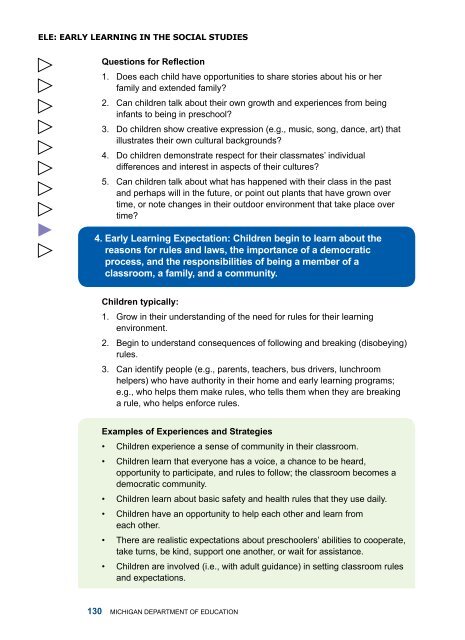Early Childhood Standards of Quality for ... - State of Michigan
Early Childhood Standards of Quality for ... - State of Michigan
Early Childhood Standards of Quality for ... - State of Michigan
Create successful ePaper yourself
Turn your PDF publications into a flip-book with our unique Google optimized e-Paper software.
ELE: EARLY LEARNING IN THE SOCIAL STUDIESQuestions <strong>for</strong> Reflection1. Does each child have opportunities to share stories about his or herfamily and extended family?2. Can children talk about their own growth and experiences from beinginfants to being in preschool?3. Do children show creative expression (e.g., music, song, dance, art) thatillustrates their own cultural backgrounds?4. Do children demonstrate respect <strong>for</strong> their classmates’ individualdifferences and interest in aspects <strong>of</strong> their cultures?5. Can children talk about what has happened with their class in the pastand perhaps will in the future, or point out plants that have grown overtime, or note changes in their outdoor environment that take place overtime?4. <strong>Early</strong> Learning Expectation: Children begin to learn about thereasons <strong>for</strong> rules and laws, the importance <strong>of</strong> a democraticprocess, and the responsibilities <strong>of</strong> being a member <strong>of</strong> aclassroom, a family, and a community.Children typically:1. Grow in their understanding <strong>of</strong> the need <strong>for</strong> rules <strong>for</strong> their learningenvironment.2. Begin to understand consequences <strong>of</strong> following and breaking (disobeying)rules.3. Can identify people (e.g., parents, teachers, bus drivers, lunchroomhelpers) who have authority in their home and early learning programs;e.g., who helps them make rules, who tells them when they are breakinga rule, who helps en<strong>for</strong>ce rules.Examples <strong>of</strong> Experiences and Strategies• Children experience a sense <strong>of</strong> community in their classroom.• Children learn that everyone has a voice, a chance to be heard,opportunity to participate, and rules to follow; the classroom becomes ademocratic community.• Children learn about basic safety and health rules that they use daily.• Children have an opportunity to help each other and learn fromeach other.• There are realistic expectations about preschoolers’ abilities to cooperate,take turns, be kind, support one another, or wait <strong>for</strong> assistance.• Children are involved (i.e., with adult guidance) in setting classroom rulesand expectations.130 <strong>Michigan</strong> Department <strong>of</strong> Education


